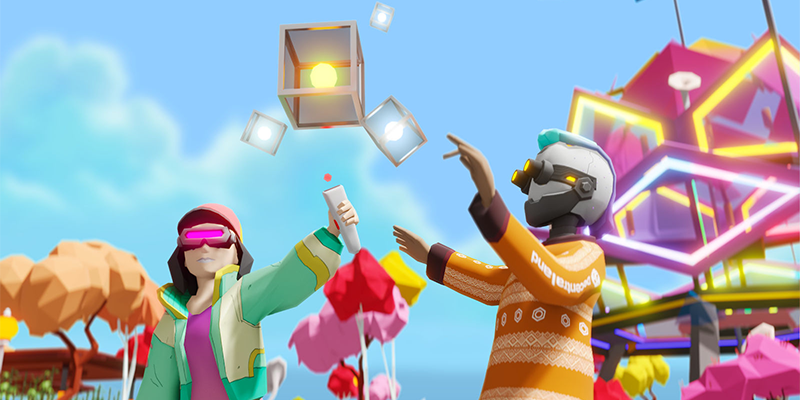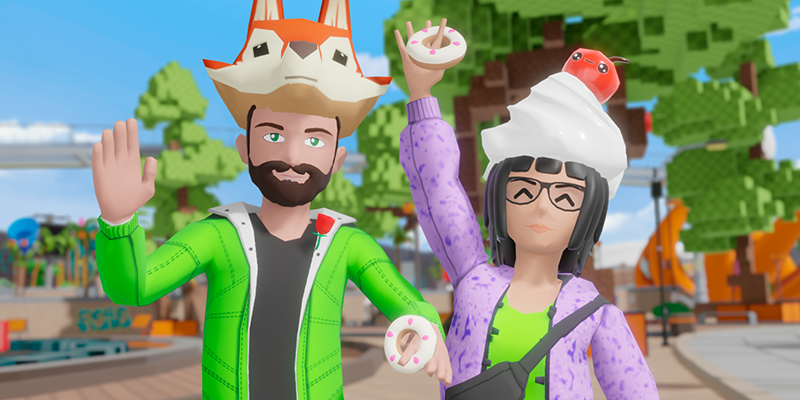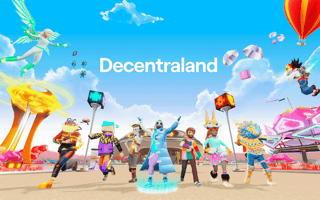Decentraland is an immersive, browser-based platform built on the Ethereum blockchain that allows users to experience a 3D, shared virtual world.
According to its whitepaper, Decentraland began as a proof of concept “for allocating ownership of digital real estate to users on a blockchain.” Per the public ledger tech, users who purchase land parcels permanently own them in the form of non-fungible tokens, or NFTs. Landowners create and monetize their own environments, marketplaces and applications.
What Is Decentraland?
Decentraland is a 3D, user-owned virtual world built on the Ethereum blockchain that allows users to buy digital real estate and meet up in the metaverse.
In practice, Decentraland functions as a marketplace and a virtual community center. While users buy and sell digital real estate, they’re also exploring that same world as it is being built. They socialize, play games, exchange collectibles or even catch music artists in concert.
“Users can build whatever they want, from virtual stores and art galleries to game arenas,” said Fraser Matthews, president at crypto exchange Netcoins. “They can also earn money from activities, such as renting out their properties, providing services and creating virtual goods.”

How Does Decentraland Work?
Decentraland launched as the public’s introduction to a monetized metaverse, and its ever-developing ecosystem relies on several factors to deliver a decentralized, digital world. Here we highlight its protocol, which keeps underlying codes running behind the scenes, as well as the project’s user-interfacing management systems — its token economy and governance.
Protocol
Decentraland uses a three-layered protocol. The consensus layer tracks the ownership of land parcels via smart contracts. The content layer renders the necessary files required from parcel to parcel. Lastly, the real-time layer enables peer-to-peer communication between users’ avatars.
All content featured within Decentraland is hosted and served via a global network of community or user-owned content servers, or nodes.
Token Economy
Decentraland’s in-world cryptocurrency and native token is known as MANA. This ERC-20 token is used to purchase everything within Decentraland, from wearables for your avatar to parcels of land, or LAND.
Unlike MANA, LAND tokens are not interchangeable. They are one-of-a-kind NFTs that can provide proof of ownership of virtual real estate. If a user were to collect multiple parcels of land adjacent to one another, they can be merged to create the third token, called Estates.
Every time users buy and register LAND, MANA tokens are “burnt.” This process permanently removes coins from circulation, cutting the supply in order to increase market value.
Upon Decentraland’s debut, LAND sold for about $20 with MANA tokens at $0.02. As of June 2023, the floor price for a plot of LAND is approximately $1,880, and MANA tokens are priced at about $0.4.
Governance
Unlike other platforms, Decentraland is entirely owned by its users through a decentralized autonomous organization. The Decentraland DAO is a decision-making body made up of Decentraland token holders. Through voting, the collective can issue grants and modify lists of banned names, points (or locations) of interest, personal-use servers called catalyst nodes as well as LAND and Estate smart contracts. Voting power is allocated respective to a user’s crypto wallet size.
To vote on proposed changes to the protocol, a user must hold wrapped MANA (MANA tokens that have been locked within the DAO, forfeiting spending or transferring abilities), LAND or Estate tokens. Wrapped MANA is equal to one vote. LAND and Estate tokens grant 2000 votes per parcel.
What Is Decentraland Built On?
Decentraland is built on the Ethereum blockchain. With Ethereum as the foundational layer of the project, Decentraland’s native coin, MANA, is set on the ERC-20 token standard, a benchmark for all Ethereum-based, fungible tokens. As one of the most widely used protocols, this allows for easy exchange with tokens from other decentralized finance, or DeFi, projects.
“By relying on the Ethereum network, Decentraland eliminates many of the hurdles faced by traditional virtual worlds while allowing it to remain secure and tamper-proof,” said Mina Tadrus, CEO of Tadrus Capital, a quant investment management firm. “Additionally, users can use Ether cryptocurrency to purchase and trade digital goods in Decentraland, creating a completely new digital economy.”
How to Get Started With Decentraland
1. Visit Decentraland.org
To check out Decentraland, use a desktop or laptop computer to visit the Decentraland website.
2. Download Decentraland Application or Use Browser Version
On the front page, users can download the Decentraland application or use the web browser. The application offers the fastest and smoothest user experience, while the web browser offers a limited experience but with no download needed.
3. Create Decentraland Account
Users must create an account to enter Decentraland, and may sign up as a guest or by connecting an existing crypto wallet. As a guest, users can explore Decentraland and buy items from its marketplace using fiat money, but won’t be able to interact with cryptocurrencies or NFTs while playing. By connecting a crypto wallet, users get the full ability to buy items with cryptocurrency, as well as use MANA and LAND.
4. Customize Decentraland Avatar
Users are prompted to customize their own avatar, which will be used to represent them on Decentraland. Preset options are available for new users, so they can customize visual features like their avatar’s face, hairstyle and outfit to their liking.
5. Start Exploring
Once all set up, users go through an optional tutorial which gets them oriented with controls and the environment. After completing this tutorial, or leaving it at any time, users get dropped into Decentraland’s starting location, Genesis Plaza. From here, users can move around and explore Decentraland.

Decentraland vs. Metaverse
Simply put, Decentraland is one planet floating in the metaverse, while the metaverse itself expands beyond just one platform.
“The metaverse is a more general term that refers to the concept of a virtual world that is accessible to everyone, while Decentraland is a specific implementation of this concept,” said Eldad Postan-Koren, co-founder and CEO at WINN.AI, a tech startup developing an artificially intelligent sales assistant, and member of the Forbes Technology Council.
“The metaverse is often used to refer to virtual worlds that are fully immersive and that can be accessed through virtual reality, while Decentraland is focused on creating a decentralized virtual reality platform,” Postan-Koren added.
Decentraland vs. Sandbox
Decentraland and The Sandbox are both decentralized, digital worlds existing in the metaverse, but have their own separate uses and assets.
For similarities, you can buy and monetize virtual real estate in either world (known as LAND in both), connect crypto wallets as well as utilize avatars and digital items. They also both reside on the Ethereum network, and operate using DAO governance.
As for differences, Decentraland focuses on providing a general, open-source virtual world with multiple uses, including digital event hosting and varied content creation (for art, apps, personal spaces and games). Sandbox on the other hand focuses on play-to-earn capabilities, letting users create games, animations and 3D content to flesh out gaming on the Ethereum blockchain. Decentraland has 19,601 total land plots available, while Sandbox has 166,464 total plots available. Also, Decentraland’s native cryptocurrency is MANA, whereas Sandbox’s is SAND.




